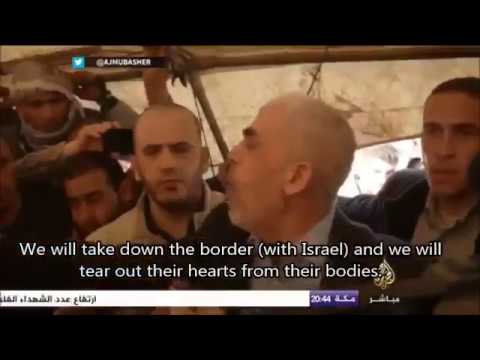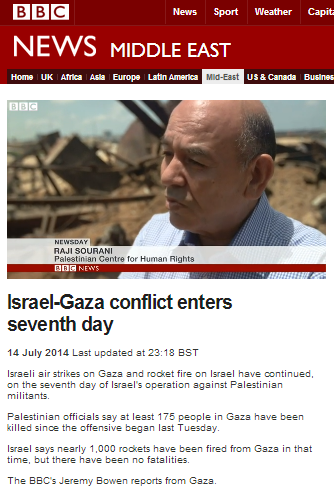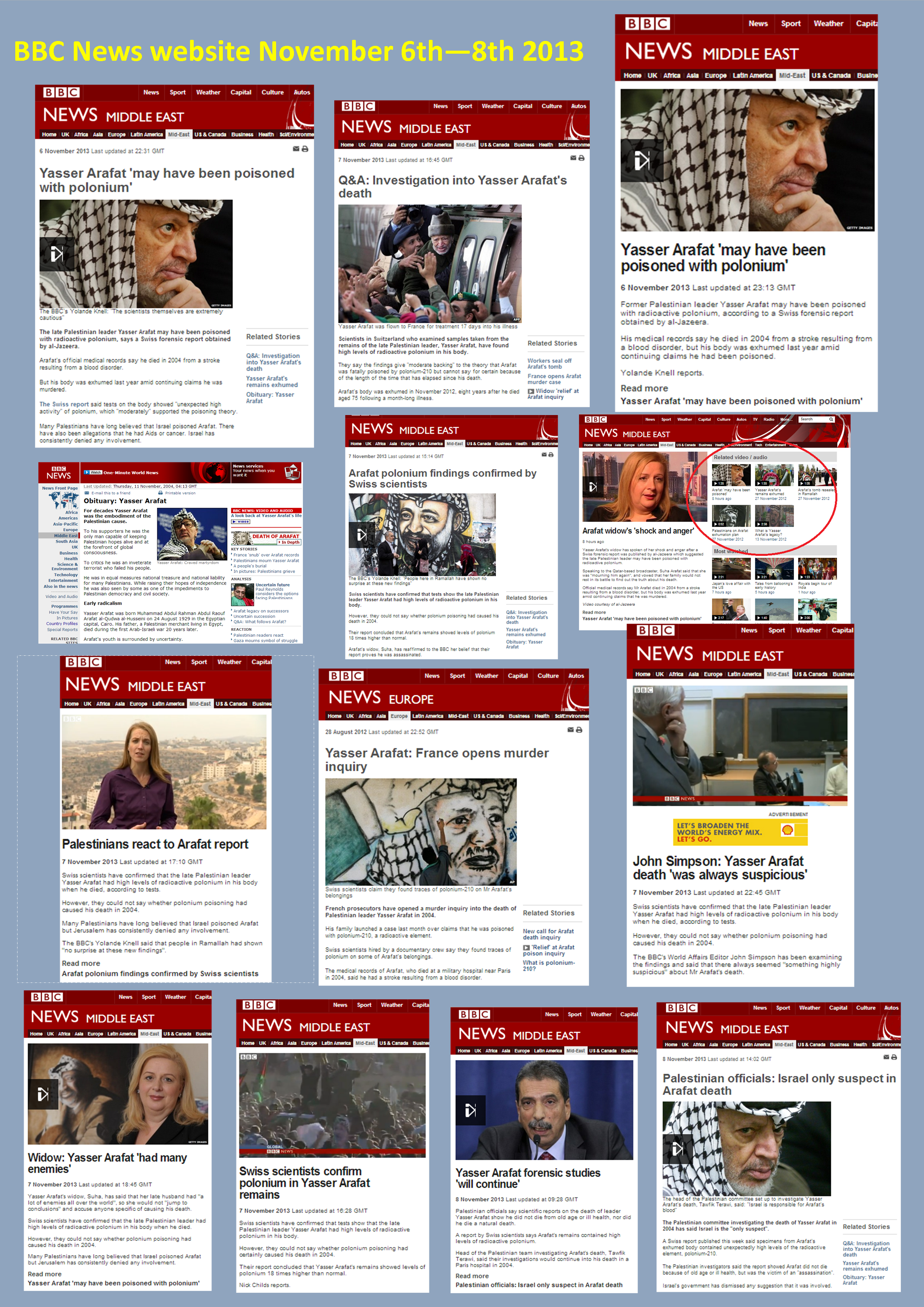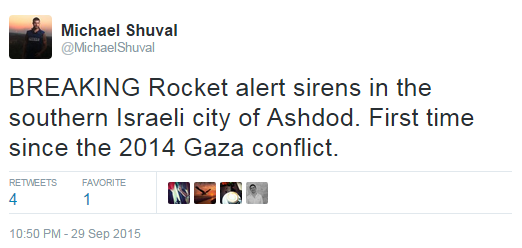As we have sadly had cause to note here on countless occasions over the past four and a half months, the BBC’s coverage of the ‘Great Return March’ propaganda stunt has not included providing audiences with details of the terror factions involved in its planning and organisation.
The BBC has repeatedly and exclusively promoted Hamas-sourced casualty figures while failing to clarify that the terror group is one of the factions involved in financing and facilitating what it repeatedly blandly describes as “protests”.
Many of the BBC’s reports have ignored or severely downplayed the violent rioting which has included hundreds of petrol bomb attacks, IED attacks, grenade attacks and shooting attacks as well as infiltration attempts and for three months the BBC ignored the issue of the arson attacks launched as part of the weekly agitprop. When it emerged that a significant proportion of those killed during the violent rioting were linked to various Gaza based terror factions, the BBC did a disappearing act.
Those editorial policies were on display once again in the July 19th edition of ‘Hardtalk‘ aired on the BBC News channel and the BBC World News channel, which will remain available to viewers in the UK on BBC iPlayer for the next eleven months.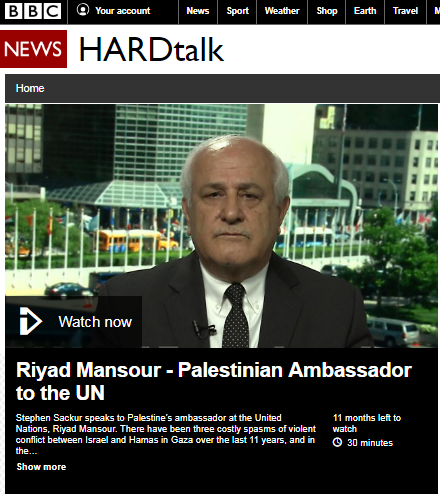
“There have been three costly spasms of violent conflict between Israel and Hamas in Gaza over the last 11 years. In the past week, a fourth seemed dangerously close. HARDtalk’s Stephen Sackur speaks to Palestine’s Ambassador at the United Nations, Riyad Mansour. With the Trump administration claiming a new US peace plan is coming soon, is there any prospect of change in the grim status quo?”
The programme commenced with presenter Stephen Sackur asking Riyad Mansour the same question three times while quoting Hamas sourced casualty figures and portraying violent rioting as ‘protests’.
[emphasis in italics in the original, emphasis in bold added]
Sackur: “Let me begin with a very grim figure. It now seems 140 Palestinians at least have been killed by Israeli forces during protests that began in March along the Gaza-Israel border. Is it not time now for senior Palestinians such as yourself to make a clear call to all Palestinians in Gaza to stop those protests in the interests of saving life?
Mansour: “Well I think you have it the wrong way. It is in the interest of saving lives that Israel should stop killing Palestinian civilians and injuring more than 15,000 since March 30th. And the international community is on the side of this kind of articulation because when we went to the Security Council seeking protection for the civilian population from Israeli attacks and aggression against our civilian population, the great majority of members of the Security Council endorsed the draft resolution which was denied by casting one single vote. And then we went to the General Assembly and we have a resolution that was adopted by 120 countries versus 8 calling for providing international protection for the civilian population in the occupied Palestinian territory and the Secretary General was asked to submit a report with recommendations and suggestions to provide protection for the civilian population – the Palestinian civilian population – including international protection mechanism and he has until the 13th of next month to submit that report. We are engaging his teams with ideas and suggestions to fulfil such a demand for providing protection for the civilian population under Israeli occupation.”
Sackur did not bother to clarify to viewers that the UN GA resolution to which Mansour referred is non-binding.
Failing to challenge his guest’s repeated inaccurate and misleading portrayal of those involved in the ‘Great Return March’ as exclusively ‘civilians’ Sackur went on:
Sackur: “There is no doubt that governments and human rights groups as well have issued words of condemnation of the way Israel’s forces have handled this on the border.”
He then repeated his question while severely downplaying the violence, attacks and border infiltrations which have characterised the weekly events since their inception.
Sackur: “Is it not time for Palestinian officials to tell all of those who gather at the border – including those who go with Molotov cocktails and those who go with the kites and the balloons which carry those firebombs over the fence and onto Israeli farmland – is it not time for you to call a halt to all of that?”
Mansour: “I think that when you have people living in that huge prison in the Gaza Strip – 2 million of them – for a long period of time, there is a tremendous amount of poverty, a dire situation and frustration. So when the civilian population decided from the 30th of March to peacefully protest against that miserable, disgusting situation why is it that, you know, that somebody to suggest for the Palestinian civilian population to stop, you know, their civilian activities, peaceful activities against this occupation, to lift the blockade and to allow the Palestinian civilians to enjoy in the Gaza Strip the access and movement…”
With no challenge to his guest’s inaccurate description of the violent rioting and attacks as ‘peaceful protest’ and making to effort to remind viewers that the Gaza Strip has not been ‘occupied’ for thirteen years, Sackur interrupted Mansour in order to pose his question for a third time.
Sackur: “Whatever the situation in terms of Israel’s open fire policy on that border, you know and Hamas leaders in Gaza know that if people go down to that border – particularly if they go with an intent to throw Molotov cocktails or fly their kites – they are going to be targeted and in the interests of saving life, is it not time for this to end?”
Mansour: “I think that it is in the interest of saving lives to do the following: one, for the Israeli armed forces not to be trigger happy to aim at civilians and to shoot them. Secondly, if international presence to get closer to the borders – whether UN international presence or Red Cross teams – I think that that would lead to saving civilian lives. It is the right of not only the civilian Palestinian population but all civilian populations in any corner of the globe have the right to peacefully protest against certain issues that are influencing them in a very negative way. That is also including the Palestinian civilian population in the occupied territory including in the Gaza Strip.”
Sackur: “Things have escalated in the last week or so as you know. Last weekend we saw roughly 200 rockets and mortars fired towards Israeli territory from positions inside Gaza. Sderot – one Israeli town – was hit. In return the Israelis used their war planes to bomb targets across Gaza. What is your message to those inside Gaza who resumed the rocket and mortar fire?”
Sackur failed to clarify that those events in fact began when an Israeli officer was wounded in a grenade attack during what only seconds before had been portrayed to BBC audiences as ‘peaceful protest’, thereby paving the way for Mansour’s subsequent distortion of events.
Mansour: “Well first of all I’m not so sure that, you know, that this cycle of violence was initiated by the Palestinians. I think it was initiated by the Israeli aircraft and their bombardment, by their artillery in which a number of children were killed – at least four – and more than 65 have been injured through this violence from the Israeli side. I don’t believe that there is, you know, but maybe one or two from the Israeli side that were injured through this cycle of violence. From our position that we declare very repeatedly, we are against the killing of innocent civilians from any side and under any conditions.”
Failing to ask Mansour exactly how that ‘position’ aligns with the Palestinian Authority’s provision of financial rewards for terrorism, Sackur allowed Mansour to claim that an “international presence” would “provide protection for our people and would put an end to any justification from the Israeli side to unleash its massive military and armed fire against the civilian population.”
Quoting a speech made by Yahya Sinwar in April, Sackur went on:
Sackur: “One more question about Hamas. Obviously you represent the Palestinian Authority as the ambassador at the United Nations. Hamas – not the Palestinian Authority – is in control in Gaza and the leader of Hamas – I think he’s styled the prime minister – Yahya Sinwar, he said of the continued protests ‘we will ultimately take down the border and we’ll tear out their hearts from their bodies’. Of course he’s talking about Israelis – Israeli citizens. What is your view of language like that?”
Mansour: “First of all, I am the representative of the State of Palestine at the United Nations and I represent not only the Palestinian National Authority – I represent all Palestinians inside the occupied territories and outside the occupied territories.”
Sackur: “So you represent Yahya Sinwar?”
Mansour: “I represent everyone.”
Sackur: “So tell me what is your message to Yahya Sinwar?”
Mansour: “I represent all the Palestinian people, including those in the Gaza Strip, here at the UN. With regard to the statement that you refer to, I did not hear it – I am a man of peace, I work under international law, I promote and uphold international law at the UN. In defending the interests of the Palestinian people I do not advocate war. I stand against aggression against all people including the Palestinian people who live under the Israeli occupation including in the Gaza Strip.”
Sackur: “It’s not so much a question of what you advocate it’s a question of what you’re prepared to unilaterally and categorically condemn. Will you condemn those words that I quoted to you?”
Mansour: “I condemn all words that harm civilian populations, whomever they’re emanating from and whomever they’re directed against.”
Refraining from exploring the obviously interesting topic of Hamas being represented at the UN according to the Palestinian envoy and ignoring Mansour’s convenient side-stepping of the issue of Hamas’ blatant agression, Sackur then changed the subject – as we will see in part two of this post.

